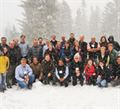
 When it comes to management and preservation of public lands, park leaders have a simple choice: Be proactive or reactive. And that decision isn't easy.
When it comes to management and preservation of public lands, park leaders have a simple choice: Be proactive or reactive. And that decision isn't easy.
Park leaders are faced with issues like climate change, habitat loss, encroachment into parks and protected lands, budget constraints and rapid changes in leadership — all of which make management a challenge.
That's where the University of California, Merced's National Parks Institute Executive Leadership Seminar steps in. UC Merced partnered with the National Park Service, the Great Valley Center, the National Parks Conservation Association and the Stanford Graduate School of Business to present the intensive 12-day leadership program.
The institute provided park leaders from the United States and nine other countries the opportunity to learn from one another and from world-renowned experts on topics like fire policy, ecosystem management, water resources and air quality that affect the future of natural lands.
The Institute at the Golden Gate in San Francisco, Golden Gate National Recreation Area, UC Merced and Yosemite National Park were used as field laboratories for observation, demonstration and discussion during the seminar.
Pulitzer Prize-winning ecologist and author E.O. Wilson, whose lecture was considered a seminar highlight by participants, commented on the value of having Yosemite almost in UC Merced's backyard.
“The opportunity for partnership between the two — and in the greater scale between an institution of the high quality and probity of the National Park system and the University of California system — is quite extraordinary for the advancement of both research and teaching,” Wilson said.
According to David Hosley, UC Merced interim vice chancellor for university relations and president emeritus of the Great Valley Center, UC Merced is playing a pivotal role in helping national parks across the globe lead strategic change.
“It's part of the university's DNA,” he said, adding that the institute is part of an agreement with National Park Service leaders made before UC Merced even opened.
Located in the heart of the Central Valley and within close proximity to Yosemite National Park, UC Merced is well-suited to lead the discussion of how to manage natural resources in a time of rapid change. Faculty from the schools of Engineering, Natural Sciences and Social Sciences, Humanities and Arts all presented on topics ranging from climate change and fire to biodiversity and working with indigenous communities.
Roger Bales, director of UC Merced's Sierra Nevada Research Institute, co-organized the leadership seminar and led an interactive session on climate literacy from the perspective that climate change is the main factor that will affect how parks are managed now and in the future.
“You just can't sit back and let nature take its course anymore,” Bales said. “There is no part of the world — no matter how remote — not affected by man because of climate change.”
National Park Service Director Jonathan B. Jarvis agrees.
“We are now seeing that natural processes — whether it's fire or flood — are being driven by climate change,” he said. “We are seeing fires more intense and longer seasons on either end.”
Bales said the power of the seminar is that it presents all pieces of the puzzle — business management and science — to create understanding of how climate change and natural pressures affect the way leaders can manage park lands and strategically plan for the future. By involving park leaders from other countries, the seminar also allows participants to explore the differences between how natural lands are managed in the U.S. compared to other nations.
“The U.S. model is much more passive than the European model,” Bales said. “We can learn a lot from that example.”
Brenda Ortiz

Senior Public Information Representative
Office: (209) 228-4203
Mobile: (209) 628-8263






